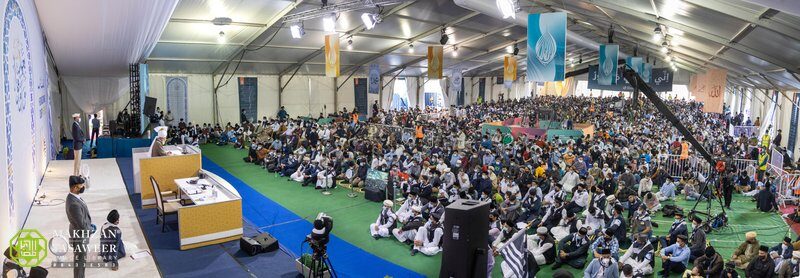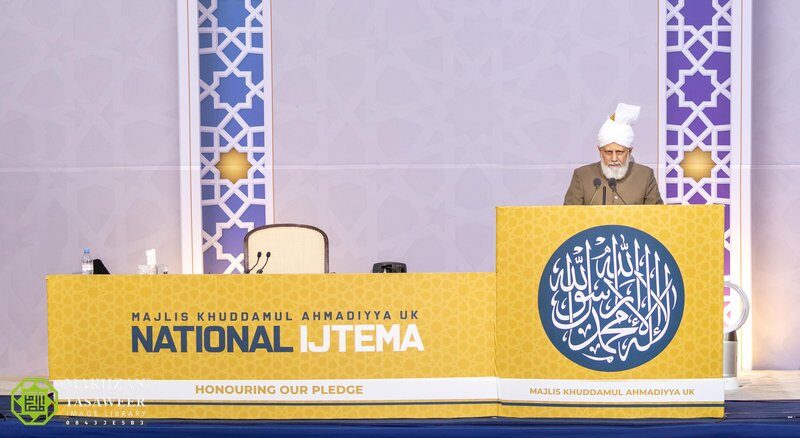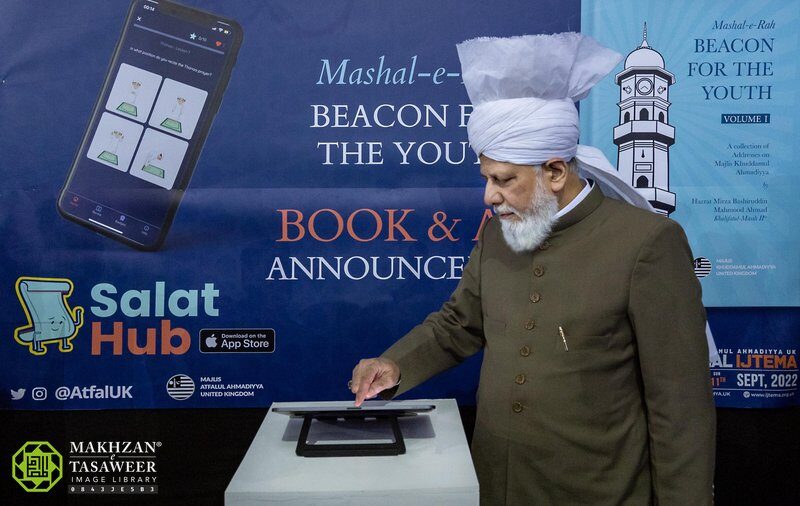
On 9-11 September 2022, Majlis Khuddam-ul-Ahmadiyya UK held their annual ijtema in Kingsley, Hampshire. On the final day, Hazrat Amirul Momineen, Khalifatul Masih V, may Allah strengthen his hand, graced the occasion to formally conclude the event with an address.
At around 16:30 BST, Hazrat Mirza Masroor Ahmad, Khalifatul Masih Vaa arrived at the ijtema site and led the congregation in Zuhr and Asr prayers. At 16:47 BST, the formal proceedings of the final session of MKA UK’s national ijtema commenced after Huzooraa invited Raheel Ahmad Sahib to recite a portion of the Holy Quran. He recited verses 92-93 of Surah al-Nahl, after which Tanzeel Ahmad Sahib was invited to present the English translation.
Hazrat Khalifatul Masih Vaa then stood up, as did all those present, and took the Khuddam-ul-Ahmadiyya pledge from everyone present.

Huzooraa then invited Jazib Cheema Sahib to recite an Urdu poem. He recited a poem written by Hazrat Mirza Ghulam Ahmad, the Promised Messiah and Mahdi, on the topic of taqwa (true fear of Allah) and the attributes of a true Muslim. Abdul Ghalib Khan Sahib presented the English translation of the couplets.
Huzooraa then invited Abdul Quddus Arif Sahib, Sadr Majlis Khuddam-ul-Ahmadiyya UK, to present the ijtema report. Sadr Sahib said that the theme for this year’s ijtema, as per Huzoor’s instruction, was “Honouring our pledge”, which was reflected in all local and regional ijtemas. He then went on to describe various aspects of the ijtema and some new additions this year. The total attendance of this year’s ijtema was 5,719. A short video presentation was then shown to Huzooraa showing highlights of the ijtema.
Anas Rana Sahib, Naib Sadr MKA UK, was then called to announce the Alam-e-Inami prize for Atfal-ul-Ahmadiyya and Khuddam-ul-Ahmadiyya, which Huzooraa awarded to the winning qiadats.
At 17:10 BST, Huzooraa conveyed “Assalamu alaikum wa rahmatullah” after which he recited tashahud and ta‘awuz and said that it was with the grace of Allah, MKA was able to hold its ijtema after two years since the Covid-19 pandemic.
Huzooraa then said:
“Originally, Majlis Khuddam-ul-Ahmadiyya had included a full sports programme in the ijtema programme. However, upon the sad demise of Her Majesty, Queen Elizabeth, I instructed Sadr Sahib that the sports and games be scaled back as a mark of respect.
“I deemed it essential because the Queen was our long-serving head of state and she led the nation with great dignity and justice for over 70 years. During her reign, the United Kingdom remained a beacon of religious freedom in the world. Indeed, the Queen herself advocated for true religious freedom and interfaith harmony on many occasions. Thus, we are grateful to have lived under such a gracious monarch.
“As Ahmadi Muslims, we should be particularly appreciative of the fact that we were given the opportunity to establish our Jamaat’s international headquarters after the migration of Hazrat Khalifatul Masih IVrh in the United Kingdom during the reign of Queen Elizabeth and we have been able to practise and propagate our religion, Islam, freely.
“In this regard, we will always be grateful to Queen Elizabeth, the British Government and this nation.
“Furthermore, we pray, that our new head of state, King Charles III continues to ensure that religious freedom and justice for all people remains a hallmark of this nation and that the rights of the people are always fulfilled.
“Anyway, I hope and pray that all of the participants will have taken great benefit from the various academic programmes and other events that did take place at the ijtema.”
Huzooraa then said that during the concluding session, he would highlight “some of the fundamental responsibilities and obligations of members of Majlis Khuddam-ul-Ahmadiyya”. Above all, Huzooraa said, the true purpose for creating man was to worship Allah. In this regard, the primary source of worship were the five daily prayers. Anyone who called themselves a Muslim must pay great attention to guarding their worship, which required them to be punctual and regular in offering their prayers.
The reason Allah had made salat obligatory was that it was indispensable and spirituality could not survive without it. By the grace of Allah, many young Ahmadis were diligent in their prayers. Yet, there was no room for complacency regarding the worship of Allah. We must never let our standards slide and seek to improve our connection with our Creator.
“Just as our physical bodies require food and air, in the same way, our souls need continuous spiritual nourishment.”
Often, people submitted before Allah with great fervour and humility when faced with any problem or difficulty. However, when circumstances became favourable again, they lost sight of their worship.
“Their spiritual state changes like the weather; sometimes it is warm, sometimes it is cold; sometimes the wind blows in one direction; sometimes, in another; sometimes after a period of hot weather, there is a torrent of rain or a cool breeze which serves as a source of temporary relief and joy, but is not a lasting pleasure. Thus, just as a person is in perpetual need of air, food and water, in the same way, if a person wishes to remain spiritually alive, they must ensure that they constantly nourish their soul through salat. Hence, throughout your lives, namaz should be the one constant companion that you never let go of.”
Huzooraa added that Muslims were instructed to come together and offer their prayers in congregation. Over the last few years, access to mosques was restricted due to the pandemic. Thankfully, Huzooraa said, the situation had now improved and we were able to hold our events like Jalsa and ijtema. Some people, however, continued to offer their prayers at home and did not come to the mosque.
“Now, as the situation has, alhamdulillah, much improved, it is necessary to return to the proper means of spiritual salvation as per the command of Allah the Almighty, which requires Muslim men to be regular in offering congregational prayers in their local mosques or salat centres as much as possible.”
Huzooraa reminded everyone that namaz helped one to refrain from sin and was the foremost means of fulfilling the purpose of our creation and reaping the blessings of Allah the Almighty. Otherwise, without prayers, our claim to believe in the Messiah of the age and belonging to this community was hollow.
Huzooraa said, it was a great favour of Allah on our Jamaat that He had bestowed this community with people who were ever-ready to offer their time and sacrifice for the sake of the Jamaat. Recently, thousands of Ahmadis had presented themselves for Jalsa Salana UK and had put aside their jobs and other occupations. Many had not slept properly for days or even weeks. However, they had never expressed fatigue or other signs of non-cooperation. There were many who offered sacrifices whenever a scheme was launched.
It was important, Huzooraa said, to remember that it was not enough to offer temporary sacrifices; rather, Allah desired a permanent state of righteousness and the way to achieve this was namaz. Allah stated in the Holy Quran:
اَقِمِ الصَّلٰوةَ ؕ اِنَّ الصَّلٰوةَ تَنۡهٰي عَنِ الۡفَحۡشَآءِ وَالۡمُنۡكَرِ ؕ وَلَذِكۡرُ اللّٰهِ اَكۡبَرُ
“Observe Prayer. Surely, Prayer restrains one from indecency and manifest evil, and remembrance of Allah indeed is the greatest virtue.” (Suran al-Ankabut, Ch.29: V.46)
In this verse, Allah instructed Muslims to offer prayers and said that salat was the means of abstaining from every vice and sin. Therefore, one must offer their prayers at the appointed time and in congregation.
In this era, there were sinful temptations at every turn which sought to disrupt the moral fabric of society. One vice Huzooraa wished to remind everyone to abstain from was falsehood.
Huzooraa said that dealings and agreements occurred at all levels of society, whether linked with one’s personal affairs or business transactions. However, it was regrettable that organisations, individuals and nations would make firm promises, after which they broke them. No matter how small or low level a deal may be, a person was duty-bound to adhere to the terms agreed on; otherwise, such a person would fall into the category of hypocrites.
Another characteristic of a hypocrite was a person who used foul language in an argument or debate. This did not behove a believer. Instead, a believer should always maintain the highest standards of good morals. As Muslims, we must ensure that we are free from such vices.
Huzooraa said that, just a few moments ago, all khuddam and atfal had stood and pledged that they would give precedence to their faith over all worldly things. Yet, words alone were futile until and unless they were accompanied by action.
“You may wonder what it means to give precedence to your faith over all worldly matters. In simple terms, it means that when it is time for prayer, one sets aside whatever else he is doing for the sake of the worship of Allah. Therefore, apart from those exceptional situations where Allah has permitted us to combine prayers or to offer them later, every khadim should offer their prayers on time and whenever possible in congregation.”

With regard to acting truthfully, Huzooraa said that khuddam were employed in different spheres of life. He guided all khuddam to abstain from deception in dealings with finances; for example, “when it comes to their tax returns, they should declare their earnings honestly and pay whatever is due to the government. Similarly, whatever official papers or documents they require for personal or business use should be obtained honestly and all declarations should be genuine and true.
“Similarly, a khadim must never resort to falsehood in terms of their chanda. If a person cannot pay at the prescribed rate, they may seek permission to pay at a lower rate, but they must not lie about their financial state because dishonesty can never lead to the blessings of Allah the Almighty.
“Another point I wish to make especially to the younger khuddam and atfal who are still in school or education is that they must be careful who they keep company with. At your age, your friends and those who you spend time with can easily influence you as has been observed, if you keep poor company, you will pick up bad habits such as lying, needlessly quarrelling, or even fighting instead of acting truthfully and being kind and considerate.
“Thus, the younger khuddam and atfal must be very conscious of their company. Make friendships with people who are sincere, who are honest and who are not involved in any immoral or senseless activities.
“Furthermore, as you get older and get more independence, do not let your guard down. Remain firm in your faith and ensure that you never fight or be abusive to others and do not use vulgar language or speak in a way that provokes others. The older khuddam must also pay heed to all of these points; otherwise, despite having accepted the Promised Messiahas and claiming to follow his teachings, you will be violating what he stood for and taught.”
Huzooraa then read out extracts of the writings of the Promised Messiahas regarding falsehood.
Huzooraa said that it was the duty of Ahmadi youth to lead a campaign and movement against all forms of falsehood and deception and they must personally lead by example. They must pledge to never tell a lie.
“Indeed, falsehood and failure to fulfil one’s promises and covenants are the root causes underpinning the widespread injustice and disorder witnessed in today’s society, be it on a small scale within the domestic environment or on a larger scale in the broader community.”
Only if we can reached those virtuous standards that free us from the shackles of hypocrisy could we come to fulfil the demands of our pledge to give priority to our faith over everything worldly. Once this was achieved by our youth, we would see a really high standard of morals and values in our khuddam.
Huzooraa said, always remember the enlightened words of Hazrat Musleh-e-Maudra that “A nation cannot be reformed without reforming its youth.” However, it should not be that these were words merely to display on banners. Huzooraa had once instructed Majlis Khuddam-ul-Ahmadiyya to make badges to display this quote. But all khuddam must strive to live by these words; in fact, all members of the Jamaat, no matter which auxiliary body they belonged to, must live by these words. Indeed, this slogan presented each khadim with a target and a challenge. Every step one khadim takes must be towards the path of righteousness.
“I also wish to say to the younger khuddam who have taken their first step into Khuddam-ul-Ahmadiyya that they should not think theirs is an age of mere recreation or fun. You have also reached an age where your thought processes and conduct should be maturing daily.
“For quite some time, I have been mentioning the early history of Islam in my Friday Sermons during which I have narrated the incidents of many young boys from that era no older than you, who were able to offer extraordinary sacrifices for the sake of Islam and achieved great successes. This was all because they understood their purpose and the challenge that lay before them. They understood that it was up to them to fulfil the purpose of their life through the worship of Allah and it was up to them to manifest the highest of morals at all times. They understood their value and worth as young Muslims. They understood the purpose of their creation and this ensured they played an outstanding role in transforming a society defined by immorality and ignorance into a pure and righteous community the like of which the world had never seen before and one that will forever serve as a beacon for all mankind.
“In this era, having firm faith in the truth of the claim of the Holy Prophetsa, it is now up to all of you to ensure that a firm adherence to the truth defines every aspect of your life whether in your personal dealings, your promises, your proclamations or any other sense. You must keep your tongue free from immoral or ignorant speech. Instead, Allah’s praise and remembrance should always be at the tip of your tongue. From this day forth, you should seek to think and act maturely and understand your status and the true magnitude of your responsibilities.”
The pledge that was taken earlier was something that must not be taken likely as the Holy Quran says:
وَاَوۡفُوۡا بِالۡعَهۡدِ ۚ اِنَّ الۡعَهۡدَ كَانَ مَسۡـُٔوۡلًا
“And fulfil the covenant; for the covenant shall be questioned about.” (Surah Bani Israil, Ch.17: V.35)
So, Huzooraa said, do not be under the misconception that repeating the words of the bai‘at or the Khuddam pledge was sufficient. One must understand the significance of the words and strive every minute of every day to fulfil it, knowing that one day, Allah will hold you accountable over your pledges of loyalty and fidelity to the Khalifa and to the Promised Messiahas.
Huzooraa then prayed that Allah enabled all khuddam and atfal to act on these words and that they were the ones to fulfil their pledges and strive towards all good endeavours and live up to the pledge of spreading the message of Islam to the corners of the earth and fly the flag of Islam high in every part of the world.
“Whether you are 15, 20, 30 or 40 or of any other age, grasp every opportunity to serve Islam as though it is your last. Without any shadow of a doubt, every khadim, according to their age, knowledge and experience, can serve the cause of Islam and the mission of the Promised Messiahas so long as they fulfil the rights of Allah’s worship and fulfil the rights of His creation and be those who never forsake the truth and who fulfil their promises and pledges.”
Huzooraa prayed that Allah enabled the khuddam and atfal to “be shining stars of Ahmadiyyat and be those who come to fulfil the true purpose of their creation. May Allah continue to bless Majlis Khuddam-ul-Ahmadiyya in every aspect. Amin.”
Huzooraa then led everyone in dua (silent prayer).
After dua, Huzooraa announced that the ishaat department of Majlis Khuddam-ul-Ahmadiyya UK was given the blessed opportunity to translate the first half of Mash‘al-e-Rah, volume 1. This book covers the initial years of Majlis Khuddam-ul-Ahmadiyya from the first address of Hazrat Musleh-e-Maudra in 1938 onwards. The English translation comprises of 26 addresses and 12 poems in total. Huzooraa named this collection A Beacon for the Youth.

Huzooraa then also announced the SalatHub mobile application to help learn the wording of namaz. Children can attain badges, which are all based on Arabic words used in the Holy Quran. Jamaat members of all ages can use the app and this is available on iOS and it will be made available on Android soon.
After taraney (choral poems) by khuddam and atfal groups, Huzooraa departed the ijtema gah at 18:05 BST.
(Report prepared by Al Hakam)

